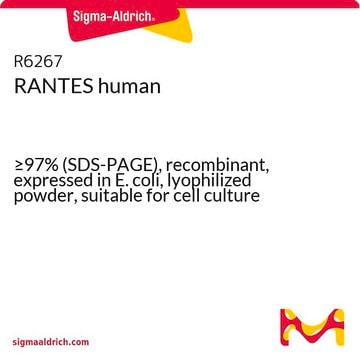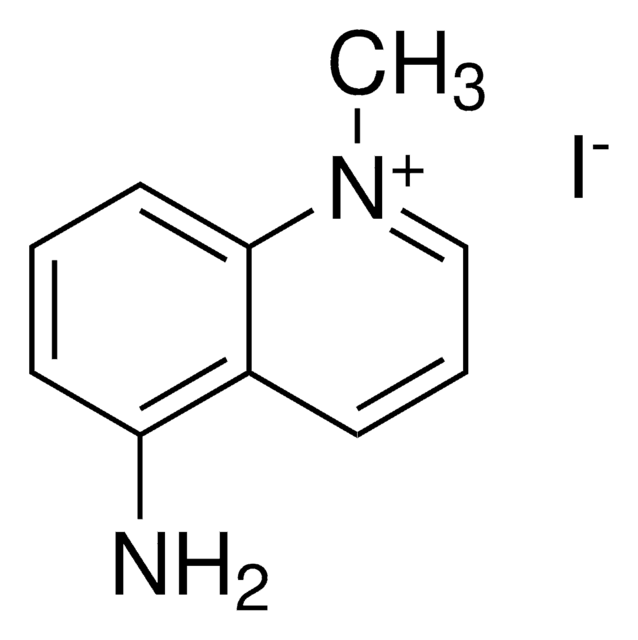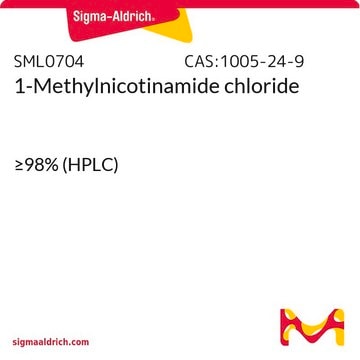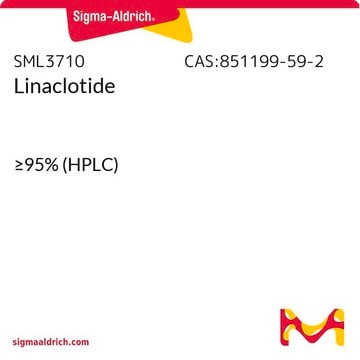SRP3269
RANTES human
Animal-component free, recombinant, expressed in E. coli, ≥98% (SDS-PAGE), ≥98% (HPLC)
Sinónimos:
CCL5, SIS-delta
Iniciar sesiónpara Ver la Fijación de precios por contrato y de la organización
About This Item
Código UNSPSC:
12352200
NACRES:
NA.32
Productos recomendados
origen biológico
human
recombinante
expressed in E. coli
Ensayo
≥98% (HPLC)
≥98% (SDS-PAGE)
Formulario
lyophilized
potencia
1.0-10.0 ng/mL
mol peso
7.8 kDa
envase
pkg of 20 μg
impurezas
<0.1 EU/μg endotoxin, tested
color
white
Nº de acceso UniProt
Condiciones de envío
wet ice
temp. de almacenamiento
−20°C
Información sobre el gen
human ... CCL5(6352)
Descripción general
Regulated on activation, normal T cell expressed and secreted (RANTES) also known as C-C motif chemokine ligand 5 (CCL5) is encoded by the gene mapped to human chromosome 17. RANTES belongs to intercrine or chemokine family of proinflammatory basic polypeptides and is expressed by various hematopoietic and non-hematopoietic cell types involved in homing and migration of effector and memory T cells during acute infections. Recombinant human RANTES is a 7.8kDa protein containing 68 amino acid residues including the four highly conserved cysteine residues present in the CC chemokines.
Aplicación
RANTES human has been used in following studies:
- In transmigration experiments to determine whether LFA-1 cross-linking could affect peripheral blood T lymphocytes (PBTL) migration in response to the chemokine RANTES.
- Luminol-dependent chemiluminescence assay to determine the effect of RANTES on reactive oxygen species (ROS) production by eosinophils.
Acciones bioquímicas o fisiológicas
Regulated on activation, normal T cell expressed and secreted (RANTES) is a chemoattractant towards monocytes, dendritic cells (DCs), memory T cells (CD4+/CD45RO), basophils, and eosinophils. The encoded chemokine protein functions as a ligand for CCR1, CCR3, and CCR5.1 RANTES inhibits the action of R5 strains of HIV-1 via blocking CCR5 receptor. The In1.1C variant of RANTES gene is linked with susceptibility to HIV-1 infection and disease progression. Hence, this can be used as a potent biomarker to determine the prognosis of HIV-1 infection.
Forma física
Lyophilized with no additives.
Reconstitución
Centrifuge the vial prior to opening. Reconstitute in water to a concentration of 0.1-1.0 mg/mL. Do not vortex. This solution can be stored at 2-8°C for up to 1 week. For extended storage, it is recommended to further dilute in a buffer containing a carrier protein (example 0.1% BSA) and store in working aliquots at -20°C to -80°C.
Código de clase de almacenamiento
10 - Combustible liquids
Clase de riesgo para el agua (WGK)
WGK 3
Punto de inflamabilidad (°F)
Not applicable
Punto de inflamabilidad (°C)
Not applicable
Elija entre una de las versiones más recientes:
Certificados de análisis (COA)
Lot/Batch Number
¿No ve la versión correcta?
Si necesita una versión concreta, puede buscar un certificado específico por el número de lote.
¿Ya tiene este producto?
Encuentre la documentación para los productos que ha comprado recientemente en la Biblioteca de documentos.
Role of chemokine and cytokine polymorphisms in the progression of HIV-1 disease.
Mahajan SD
Biochemical and Biophysical Research Communications, 396(2), 348-352 (2010)
Upregulated response to chemokines in oxidative metabolism of eosinophils in asthma and allergic rhinitis.
Sannohe S
The European Respiratory Journal, 21(6), 925-931 (2003)
J J Oppenheim et al.
Annual review of immunology, 9, 617-648 (1991-01-01)
A family consisting of at least ten distinct novel 8-10 kd cytokines has been identified over the past 12 years. These cytokines exhibit from 20 to 45% homology in amino acid sequence, are probably all basic heparin-binding polypeptides, and have
RANTES-activated human T lymphocytes. A role for phosphoinositide 3-kinase.
Turner L
Journal of Immunology, 155(5), 2437-2444 (1995)
The Role of Genetic Polymorphisms in the
Chemokine and Their Receptors and Cytokines
in the Human Immunodeficiency Virus Type 1
(HIV-1) Infection
Chemokine and Their Receptors and Cytokines
in the Human Immunodeficiency Virus Type 1
(HIV-1) Infection
Nancy Dumais
HIV and AIDS - Updates on Biology, Immunology, Epidemiology and Treatment Strategies (2011)
Nuestro equipo de científicos tiene experiencia en todas las áreas de investigación: Ciencias de la vida, Ciencia de los materiales, Síntesis química, Cromatografía, Analítica y muchas otras.
Póngase en contacto con el Servicio técnico








